9A Unit4 Growing up Welcome to the unit
文档属性
| 名称 | 9A Unit4 Growing up Welcome to the unit | 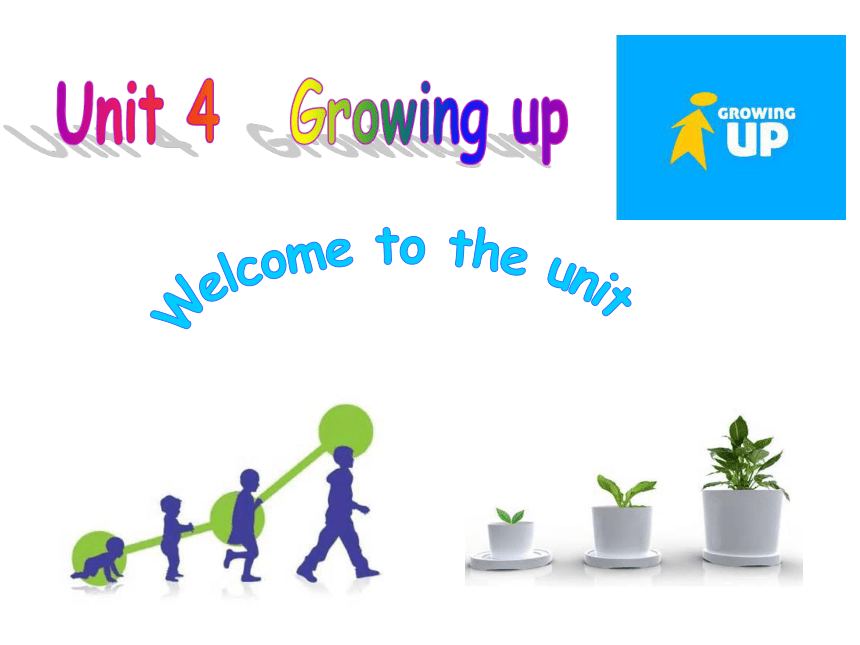 | |
| 格式 | zip | ||
| 文件大小 | 2.0MB | ||
| 资源类型 | 教案 | ||
| 版本资源 | 牛津译林版 | ||
| 科目 | 英语 | ||
| 更新时间 | 2014-10-19 18:00:11 | ||
图片预览


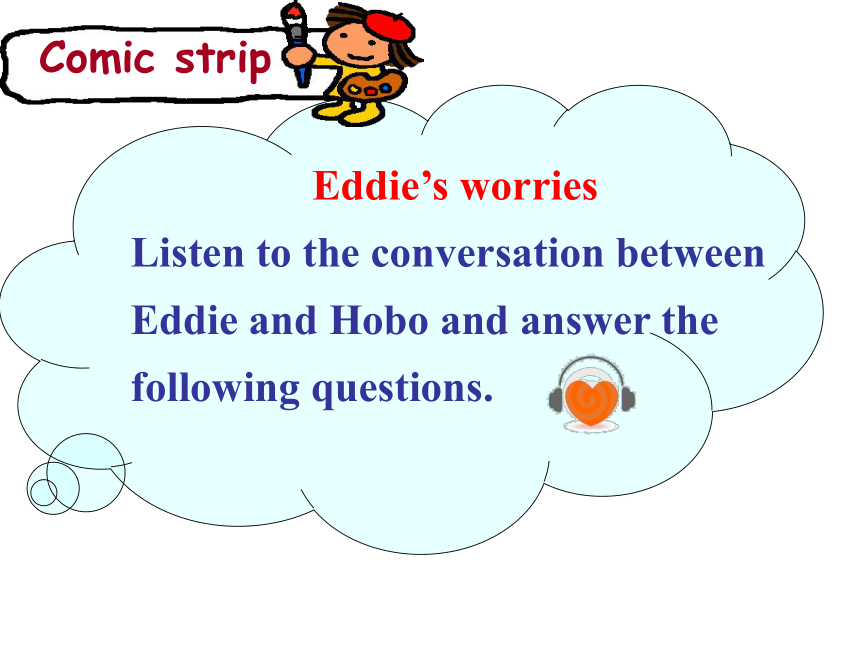
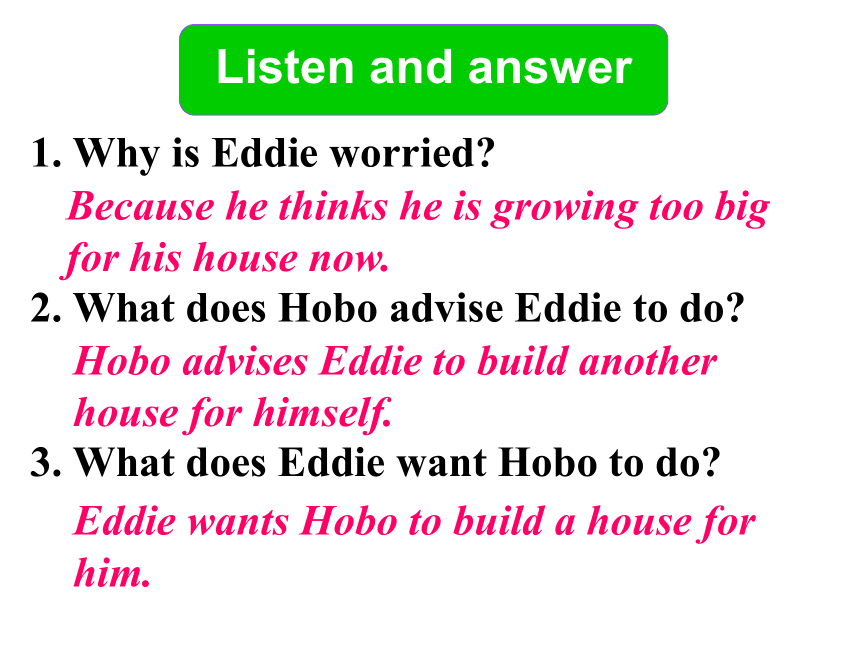
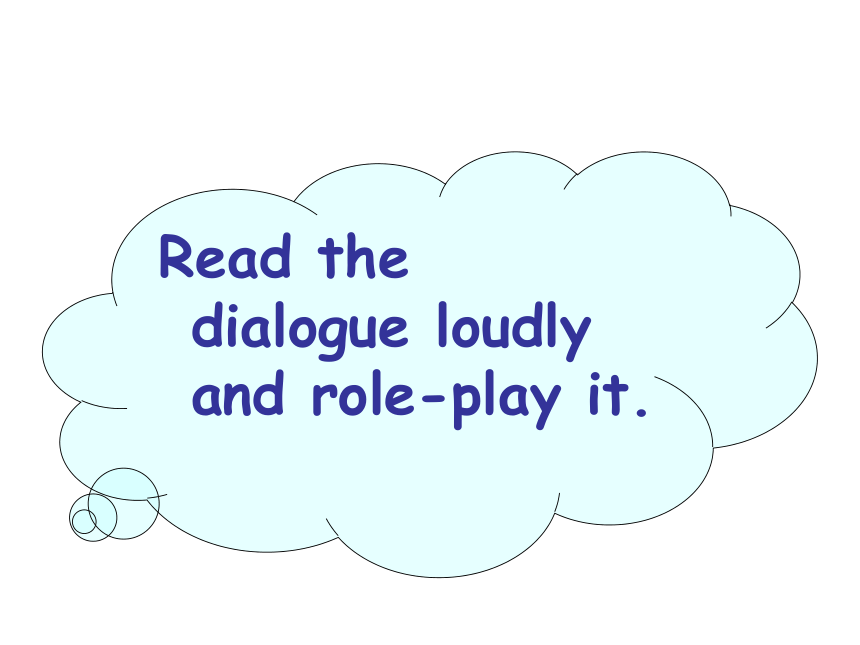
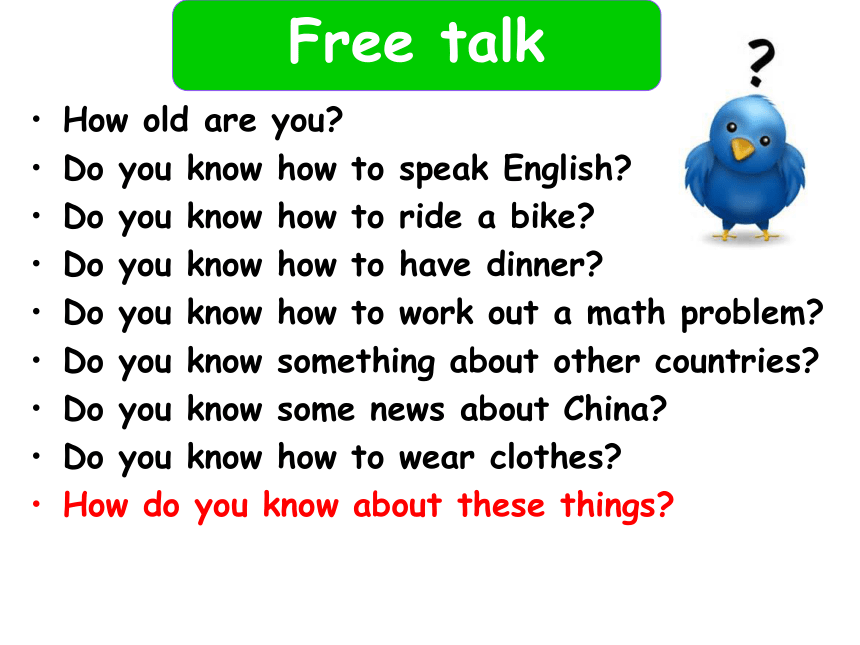
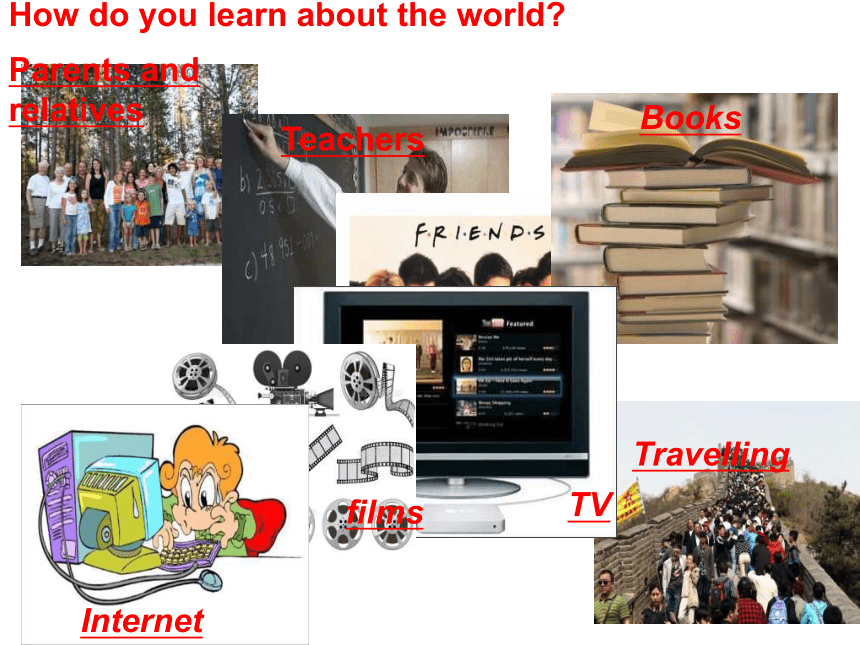

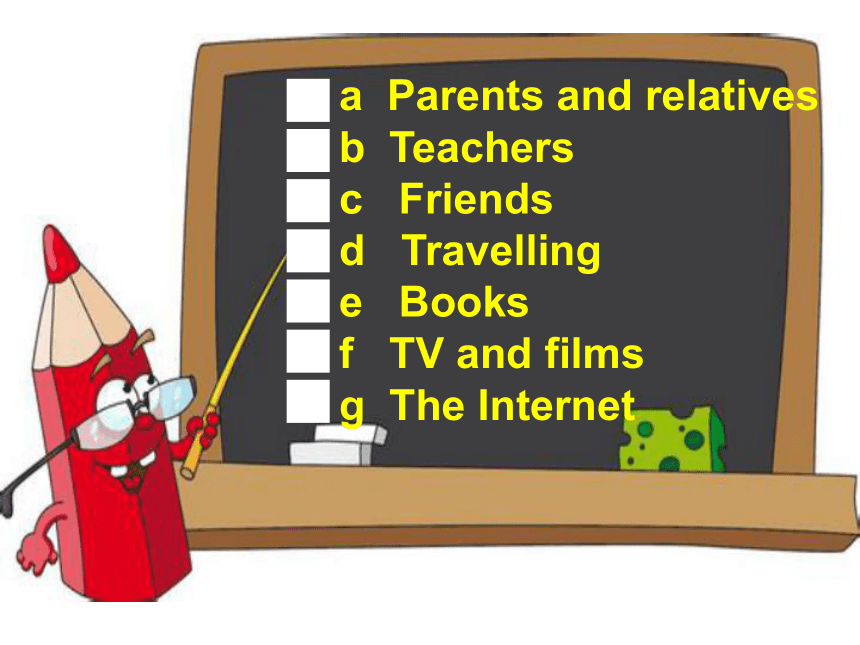
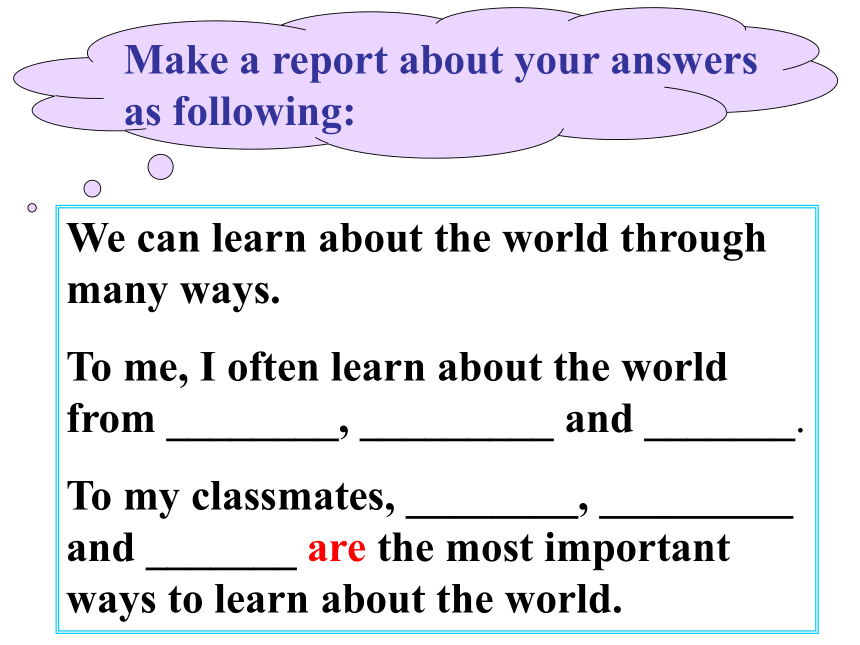
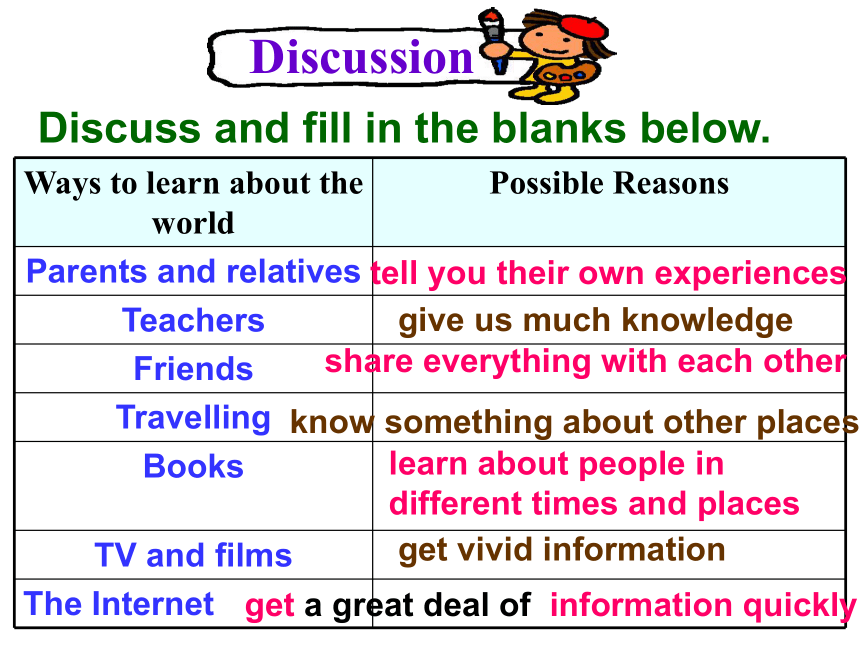
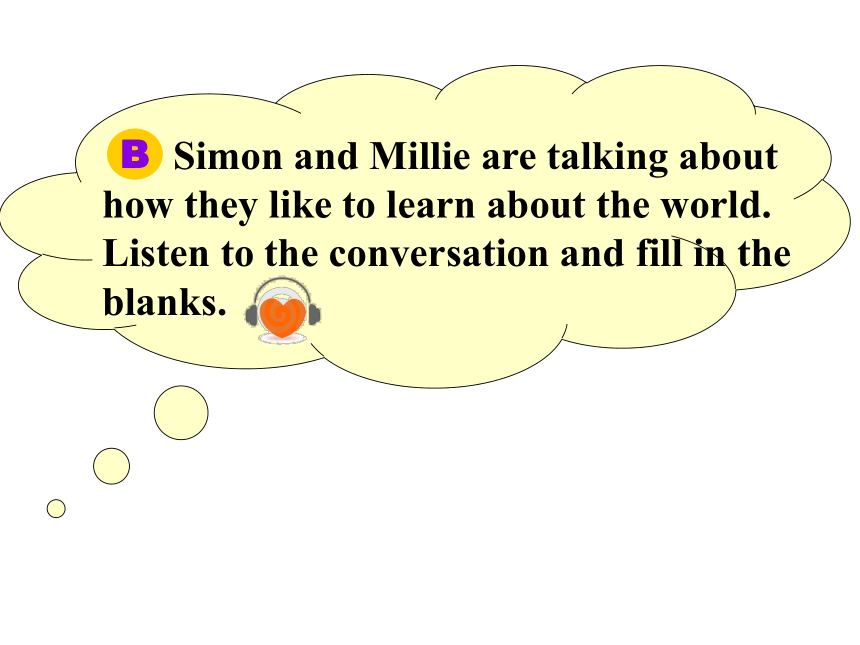
文档简介
课件33张PPT。Welcome to the unit Unit 4 Growing up on one’s mind
time
whenever
through
as soon as
deal
a great deal (of) 挂在心上;惦念
n. 时期;时代
conj. 无论何时
prep. 以,凭借
一……就
n. 很多
大量,许多Eddie’s worries
Listen to the conversation between Eddie and Hobo and answer the following questions.Comic stripListen and answer 1. Why is Eddie worried?
2. What does Hobo advise Eddie to do?
3. What does Eddie want Hobo to do?Because he thinks he is growing too big for his house now.Hobo advises Eddie to build another house for himself.Eddie wants Hobo to build a house for him.Read the dialogue loudly and role-play it.How old are you?
Do you know how to speak English?
Do you know how to ride a bike?
Do you know how to have dinner?
Do you know how to work out a math problem?
Do you know something about other countries?
Do you know some news about China?
Do you know how to wear clothes?
How do you know about these things?Free talkHow do you learn about the world?Parents and relativesTeachersTravellingBooksTVfilmsInternet Mr. Wu is asking the Class 1, Grade 9 students to do a survey on how they learn about the world. Tick (√) three boxes that you think are the most important ways you learn about the world.A a Parents and relatives
b Teachers
c Friends
d Travelling
e Books
f TV and films
g The InternetWe can learn about the world through many ways.
To me, I often learn about the world from ________, _________ and _______.
To my classmates, ________, _________ and _______ are the most important ways to learn about the world.Make a report about your answers as following:Discussion Discuss and fill in the blanks below. tell you their own experiences give us much knowledgeshare everything with each other know something about other placeslearn about people in different times and places get a great deal of information quickly get vivid information Simon and Millie are talking about how they like to learn about the world. Listen to the conversation and fill in the blanks.BIt’s quick. As soon as he click the mouse, there’s a great deal of information.Books allow her to learn about people in different times and places, and she can read them whenever she wants to.through the Internetfrom booksRead and try to recite the conversations in 5-10 minutes.Role-play1. Role play the conversation in groups;
2. Role play the conversation in front of the class.Let’s see which group does the best.Work in pairs and talk about your ideas. Use the conversation as a model.A: How do you learn about the world?
B: ....
A: Why do you like to learn that way?
B: ....What about you?
A: ....
B: Is that so?/Why?
A: ...Language pointsallow (doing) sth 允许(做)某事。如:
Law doesn’t allow any mistakes.
法律不允许任何错误。
We don’t allow eating in the classrooms.
(我们)不允许在教室吃饭。
2. allow sb to do sth 允许某人做某事。如:
My parents don’t allow me to go out at night.
我父母不允许我晚上出去。
Her boss doesn’t allow her to use the telephone.
她的老板不允许她使用电话。
注:有时用于被动语态,但是被动语态时allow后面只能用to do作宾语即 be allowed to do sth。如:
Passengers are not allowed to smoke.
乘客不准吸烟。
time
可数名词表示“次数” “时代”
不可数名词表示“时间”
区别:
sometime
some time
some times
sometimes 某个时候 when一些时间 how long 有时 how often 几次how many times… and I can read them whenever I want to.whenever意为“在任何……时候;无论何时”。作连词可引导让步状语从句。类似的词还有whatever (无论什么), wherever (无论哪里), whoever(无论谁)等。如:Whatever you say, I’ll believe you.
无论你说什么,我都相信你。
Whoever telephones, tell them I’m out.
不管是谁打电话,都说我出去了。Through的用法
1. 作介词 从…中通过(强调从物体内部或一定范围内)
On our way we had to pass through forest.
The sunlight was coming in through the window.
辨析:through ,across ,over
(1)The train has to go _________ the tunnel.
(2)Go _______the bridge ______ the river, and you will find the shop.
2 通过,凭借(方法手段),经由
He became rich through hard work and ability.
We learn to speak through speaking.
3 由于,因为…的关系
He failed through lack of experience.
4 自始至终;从头到尾/底
We worked through the night. throughacrossoverthrough & by 表示“通过”时,区别:
1. through 后常加名词表示手段媒介
He became rich through hard work.
He bought the book through a friend.
2. by 后常加工具具体名词以及-ing 形式
(1).表示以一般的方法或方式。如: No one in those days could live by writing poems.
(2)表示传达、传递的方式或媒介。如: How did you send the letter, by airmail or by ordinary mail?
He got that job _____ his uncle.
You can succeed _____ working hard.
I sent the letter______ airmail. throughbybyas soon as引导时间状语从句,“一……就……”
1.主句一般将来时,从句用一般现在时代替一般将来时
如:I will tell him the news as soon as he comes back。
2. 指紧接着发生的两个短动作,主从句都用一般过去时
如 He took out his English books as soon as he sat down.
翻译:
I’ll write you as soon as I get there.
我一到那儿就给你来信。
As soon as I went in, Katherine cried out with pleasure.
我一进门,Katherine 就高兴的叫起来
I’ll return the book as soon as I read it.
我一读完就把书还回去。1. a great deal of+不可数名词表示”大量的”
He has given me a great deal of help.
他给了我很多帮助。
2. a great deal用在形容词或副词的比较级前,表示“大量;许多”
如: We learned a great deal from them.
我们从他们那里学到很多东西。
He ran a great deal faster than I.
他跑得比我快多了。英语中有很多短语表示“大量;许多”,根据性质可分为以下三类:
★ 修饰可数名词的有:a large / great number of谓语动词用复数形式。如:
★ 修饰不可数名词的有:a large amount of/a great deal of等,谓语动词用单数形式。如:
He has spent a large amount of money on his new house.
他在新房子上花费了许多钱。
★ 既能修饰可数名词,又能修饰不可数名词的有:a lot of, lots of, 等,谓语动词根据被修饰的名词是可数还是不可数来决定单复数形式。如:
There are a lot of / lots of people in that room.
那个房间里有许多人。
There’s a lot of / lots of rice in the bag.
那只口袋里有许多大米。
plenty of +可数/不可数,只用于肯定句on one’s mind(名词)挂念在心上
He looks as if he has something on his mind. 他仿佛有什么心事似的。
其他常见用法: make up one’s mind to do sth
mind(动词介意) doing sth.
Do/Would you mind +doing…?
Would you mind lending me your bike?
Do/Would you mind +one’s+doing…?
Do you mind my (或me) smoking here?
Don’t wake me up until you finish building it.当它用于否定句时,意为“直到……才……”,表示句中的动作直到until所表示的时间才开始发生,主句谓语动词常用非延续性动词。You?mustn’t eat anything?until?you see the doctor.
直到你看过医生才准你吃东西。 I:根据句意及首字母或汉语提示完成句子
1.We must try our best_________(无论什么) we do.
2.You can’t leave your son by h_______ at home.
3.The loss of the money has been a weight on my m_____.
II:根据汉语意思完成句子
1.不论发生什么事,我都不会改变心意。
__________ happens, I won’t change my mind.
2.每个人登机前都要通过安检。
Everyone must go______ the security check before boarding the plane.
3.学英语最好的方法是尽可能地多说。
The best way to learn English is to speak it as_______ as_______.whateverimselfindWhateverthroughsoonpossible4.我一到杭州就给你打电话。
I will call you as_____ as I______ in Hangzhou.
5.他给了我很多帮助。
He has given me__ _____ ____ _____ help.
6.那只袋子里有许多大米。
There_____ a lot of rice in the bag.
那个房间里有许多人。
There_____ lots of people in that room.soonarrive a great deal ofisare1. Boys and girls, calm down and focus on the test paper ______ you begin to think about the answers. Be confident. You can do it! (2013黑龙江哈尔滨)
A. as if B. as soon as C. although
2. Helen is going to talk with you as soon as she ________ (finish) her work.
(2013贵州遵义)finishes1. The film takes us back to the _______ of the American War of Independence.
2. I’ll discuss it with you ________ you like.
3. I heard of the job _______ a newspaper advertisement.I. 用方框中词的适当形式填空。whenever through time timethroughwheneverII. 根据汉语及提示翻译下列句子。
1. 萨拉,你看起来很焦虑。有什么事吗?(on one’s mind)
__________________________________
_______________________________
2. 我一见到他就告诉他。(as soon as)
__________________________________
_______________________________
3. 出现了很多变化。(a great deal of)
__________________________________
_______________________________You look worried, Sarah. Is there something on your mind?I will tell him as soon as I see him.There has been a great deal of change.1. Preview the new words and
expressions.
2. Preview the Reading on P50-51.
3. Search for some information about Spud Webb.Homework
time
whenever
through
as soon as
deal
a great deal (of) 挂在心上;惦念
n. 时期;时代
conj. 无论何时
prep. 以,凭借
一……就
n. 很多
大量,许多Eddie’s worries
Listen to the conversation between Eddie and Hobo and answer the following questions.Comic stripListen and answer 1. Why is Eddie worried?
2. What does Hobo advise Eddie to do?
3. What does Eddie want Hobo to do?Because he thinks he is growing too big for his house now.Hobo advises Eddie to build another house for himself.Eddie wants Hobo to build a house for him.Read the dialogue loudly and role-play it.How old are you?
Do you know how to speak English?
Do you know how to ride a bike?
Do you know how to have dinner?
Do you know how to work out a math problem?
Do you know something about other countries?
Do you know some news about China?
Do you know how to wear clothes?
How do you know about these things?Free talkHow do you learn about the world?Parents and relativesTeachersTravellingBooksTVfilmsInternet Mr. Wu is asking the Class 1, Grade 9 students to do a survey on how they learn about the world. Tick (√) three boxes that you think are the most important ways you learn about the world.A a Parents and relatives
b Teachers
c Friends
d Travelling
e Books
f TV and films
g The InternetWe can learn about the world through many ways.
To me, I often learn about the world from ________, _________ and _______.
To my classmates, ________, _________ and _______ are the most important ways to learn about the world.Make a report about your answers as following:Discussion Discuss and fill in the blanks below. tell you their own experiences give us much knowledgeshare everything with each other know something about other placeslearn about people in different times and places get a great deal of information quickly get vivid information Simon and Millie are talking about how they like to learn about the world. Listen to the conversation and fill in the blanks.BIt’s quick. As soon as he click the mouse, there’s a great deal of information.Books allow her to learn about people in different times and places, and she can read them whenever she wants to.through the Internetfrom booksRead and try to recite the conversations in 5-10 minutes.Role-play1. Role play the conversation in groups;
2. Role play the conversation in front of the class.Let’s see which group does the best.Work in pairs and talk about your ideas. Use the conversation as a model.A: How do you learn about the world?
B: ....
A: Why do you like to learn that way?
B: ....What about you?
A: ....
B: Is that so?/Why?
A: ...Language pointsallow (doing) sth 允许(做)某事。如:
Law doesn’t allow any mistakes.
法律不允许任何错误。
We don’t allow eating in the classrooms.
(我们)不允许在教室吃饭。
2. allow sb to do sth 允许某人做某事。如:
My parents don’t allow me to go out at night.
我父母不允许我晚上出去。
Her boss doesn’t allow her to use the telephone.
她的老板不允许她使用电话。
注:有时用于被动语态,但是被动语态时allow后面只能用to do作宾语即 be allowed to do sth。如:
Passengers are not allowed to smoke.
乘客不准吸烟。
time
可数名词表示“次数” “时代”
不可数名词表示“时间”
区别:
sometime
some time
some times
sometimes 某个时候 when一些时间 how long 有时 how often 几次how many times… and I can read them whenever I want to.whenever意为“在任何……时候;无论何时”。作连词可引导让步状语从句。类似的词还有whatever (无论什么), wherever (无论哪里), whoever(无论谁)等。如:Whatever you say, I’ll believe you.
无论你说什么,我都相信你。
Whoever telephones, tell them I’m out.
不管是谁打电话,都说我出去了。Through的用法
1. 作介词 从…中通过(强调从物体内部或一定范围内)
On our way we had to pass through forest.
The sunlight was coming in through the window.
辨析:through ,across ,over
(1)The train has to go _________ the tunnel.
(2)Go _______the bridge ______ the river, and you will find the shop.
2 通过,凭借(方法手段),经由
He became rich through hard work and ability.
We learn to speak through speaking.
3 由于,因为…的关系
He failed through lack of experience.
4 自始至终;从头到尾/底
We worked through the night. throughacrossoverthrough & by 表示“通过”时,区别:
1. through 后常加名词表示手段媒介
He became rich through hard work.
He bought the book through a friend.
2. by 后常加工具具体名词以及-ing 形式
(1).表示以一般的方法或方式。如: No one in those days could live by writing poems.
(2)表示传达、传递的方式或媒介。如: How did you send the letter, by airmail or by ordinary mail?
He got that job _____ his uncle.
You can succeed _____ working hard.
I sent the letter______ airmail. throughbybyas soon as引导时间状语从句,“一……就……”
1.主句一般将来时,从句用一般现在时代替一般将来时
如:I will tell him the news as soon as he comes back。
2. 指紧接着发生的两个短动作,主从句都用一般过去时
如 He took out his English books as soon as he sat down.
翻译:
I’ll write you as soon as I get there.
我一到那儿就给你来信。
As soon as I went in, Katherine cried out with pleasure.
我一进门,Katherine 就高兴的叫起来
I’ll return the book as soon as I read it.
我一读完就把书还回去。1. a great deal of+不可数名词表示”大量的”
He has given me a great deal of help.
他给了我很多帮助。
2. a great deal用在形容词或副词的比较级前,表示“大量;许多”
如: We learned a great deal from them.
我们从他们那里学到很多东西。
He ran a great deal faster than I.
他跑得比我快多了。英语中有很多短语表示“大量;许多”,根据性质可分为以下三类:
★ 修饰可数名词的有:a large / great number of谓语动词用复数形式。如:
★ 修饰不可数名词的有:a large amount of/a great deal of等,谓语动词用单数形式。如:
He has spent a large amount of money on his new house.
他在新房子上花费了许多钱。
★ 既能修饰可数名词,又能修饰不可数名词的有:a lot of, lots of, 等,谓语动词根据被修饰的名词是可数还是不可数来决定单复数形式。如:
There are a lot of / lots of people in that room.
那个房间里有许多人。
There’s a lot of / lots of rice in the bag.
那只口袋里有许多大米。
plenty of +可数/不可数,只用于肯定句on one’s mind(名词)挂念在心上
He looks as if he has something on his mind. 他仿佛有什么心事似的。
其他常见用法: make up one’s mind to do sth
mind(动词介意) doing sth.
Do/Would you mind +doing…?
Would you mind lending me your bike?
Do/Would you mind +one’s+doing…?
Do you mind my (或me) smoking here?
Don’t wake me up until you finish building it.当它用于否定句时,意为“直到……才……”,表示句中的动作直到until所表示的时间才开始发生,主句谓语动词常用非延续性动词。You?mustn’t eat anything?until?you see the doctor.
直到你看过医生才准你吃东西。 I:根据句意及首字母或汉语提示完成句子
1.We must try our best_________(无论什么) we do.
2.You can’t leave your son by h_______ at home.
3.The loss of the money has been a weight on my m_____.
II:根据汉语意思完成句子
1.不论发生什么事,我都不会改变心意。
__________ happens, I won’t change my mind.
2.每个人登机前都要通过安检。
Everyone must go______ the security check before boarding the plane.
3.学英语最好的方法是尽可能地多说。
The best way to learn English is to speak it as_______ as_______.whateverimselfindWhateverthroughsoonpossible4.我一到杭州就给你打电话。
I will call you as_____ as I______ in Hangzhou.
5.他给了我很多帮助。
He has given me__ _____ ____ _____ help.
6.那只袋子里有许多大米。
There_____ a lot of rice in the bag.
那个房间里有许多人。
There_____ lots of people in that room.soonarrive a great deal ofisare1. Boys and girls, calm down and focus on the test paper ______ you begin to think about the answers. Be confident. You can do it! (2013黑龙江哈尔滨)
A. as if B. as soon as C. although
2. Helen is going to talk with you as soon as she ________ (finish) her work.
(2013贵州遵义)finishes1. The film takes us back to the _______ of the American War of Independence.
2. I’ll discuss it with you ________ you like.
3. I heard of the job _______ a newspaper advertisement.I. 用方框中词的适当形式填空。whenever through time timethroughwheneverII. 根据汉语及提示翻译下列句子。
1. 萨拉,你看起来很焦虑。有什么事吗?(on one’s mind)
__________________________________
_______________________________
2. 我一见到他就告诉他。(as soon as)
__________________________________
_______________________________
3. 出现了很多变化。(a great deal of)
__________________________________
_______________________________You look worried, Sarah. Is there something on your mind?I will tell him as soon as I see him.There has been a great deal of change.1. Preview the new words and
expressions.
2. Preview the Reading on P50-51.
3. Search for some information about Spud Webb.Homework
